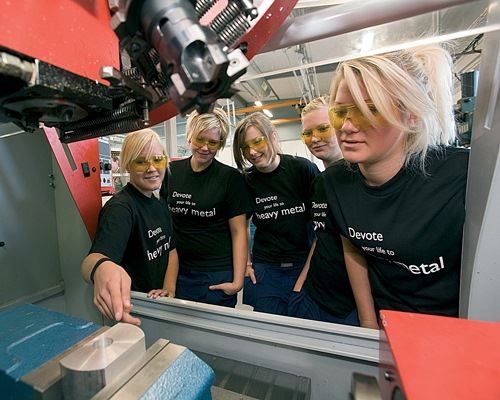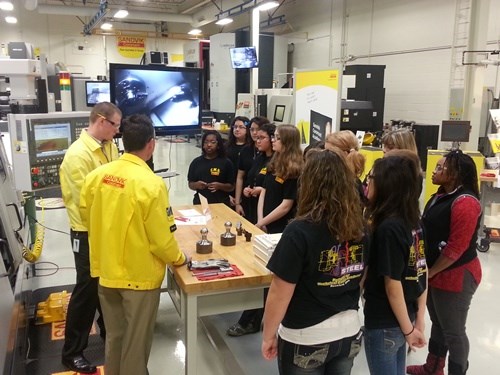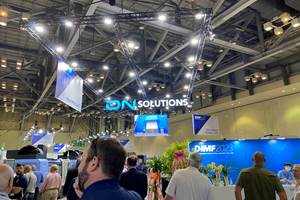The “skills gap,” the difficulty finding employees with manufacturing skills, is not just an American problem. Manufacturers in Europe and Asia have that difficulty, too, says Klas Forsström, global president of cutting tool maker Sandvik Coromant. Filling these positions is a challenge for the company’s customers in any country, he says. It is a challenge for Sandvik Coromant, too.
Yet the true challenge is larger. At issue today is not just the skills of people starting work in the industry, but also the awareness and expectations of those who have worked in it a long time. Recently, I spoke with Mr. Forsström and John Israelsson, Sandvik Coromant’s president for the Americas. The aim was to talk about trends affecting cutting tools, but I was struck by how often our conversation returned to the theme of training, of advancing knowledge within manufacturing. Both men see this as a key area in which their own company has to challenge itself to keep on adapting.
Machining composites offers an example, Mr. Israelsson says. The company has developed advanced tooling for composite materials. However, these cutters demand particular machining techniques unfamiliar to many shops. Therefore, beyond just selling customers a tool, marketing this tooling is inherently a training issue. The company needs to get customers to its demo facilities, and needs to rethink those facilities to deal with the dust from machining these materials. As special materials with special machining needs become more common, he says this link between tooling and teaching will also become more common. As a result, not only is the company learning about machining as it always has, but increasingly, it is also learning about learning.
Within this theme of knowledge in manufacturing, here are other observations the men made:
1. We need to attract new minds into industry.
This seems like an obvious point. Less obvious is the extent to which companies ought to view this as a necessary investment in the health of manufacturing, not just an occasional act of community outreach. Mr. Israelsson says his company routinely brings school-age children into its facilities as a means of conveying how sophisticated, and even fun, modern manufacturing technology can be. But after appealing to these young people, there is a vital further step. “We also have to hire some of them,” he says. Creating employment opportunities for smart, creative individuals who have no previous manufacturing experience is another necessary investment.
2. Young people are better prepared than we imagine.
This observation is the flip side of the so-called “skills gap.” Sometimes when we perceive this gap, we are looking at skills too narrowly. Those who have worked in machining for decades have seen it become steadily more engaged with computer technology, but the same senior people can have a hard time appreciating just how far the work has now moved in this direction. Young people, as acclimated as they are to digital technology, have an inherent readiness for manufacturing in the form it takes today. The industry-specific basics can be taught, Mr. Forsström says. He notes, “We are talking about using technology, using the computer, using mathematics to make something.” Once young people understand that this is the promise of manufacturing, he says, many are thrilled by the possibility.
3. Knowledge entails putting the pieces together.
For Sandvik Coromant today, technology R&D is routinely collaborative. The company’s understanding of composites, for example, came from working with both material suppliers and major manufacturers using the materials. As a cutting tool provider, the company cannot expect, by itself, to keep up with all of the developments away from the cutting tool that might affect the success of a high-performance machining process.
This point is related to points 1 and 2 because it describes why all of us, to a certain extent, will continue to encounter this industry as though we are new to it. We will never get free of this newness, or at least we shouldn’t get free of it. Technologies are changing in enough different ways that manufacturers determined to move forward can only do so by integrating new possibilities into their thinking from time to time, and by sometimes embracing methods and capabilities that require the development of brand new skills. Another “skills gap” is always waiting to be crossed.
Mr. Israelsson says manufacturing companies too often assume their own current knowledge is complete and their own internal knowledge is comprehensive. The resulting lack of openness is one of the chief factors he sees inhibiting manufacturers today. A company such as his, even though it has experience in widely varying industries and applications, often is not invited to participate in new manufacturing projects early enough to contribute to some of the most important decisions for controlling overall process cost. The reason is not that people are closed-minded, Mr. Israelsson says, but that companies’ systems do not provide a natural way to welcome and evaluate outside input. Finding structural ways to institute openness can provide one of the most valuable ways for manufacturing companies to invest in advancing knowledge.































.jpg;maxWidth=300;quality=90)







